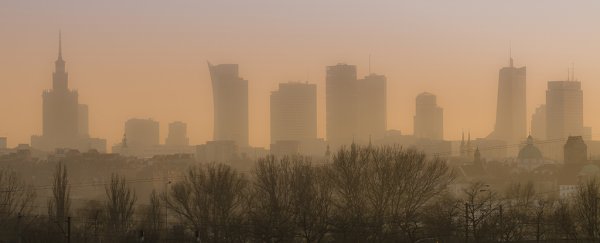We just aren't making babies like we used to. For many it's a choice, but fertility problems – particularly among men – also seems to be on the rise across the world.
New research suggests certain air particles less than 2.5 micrometres in size are impacting the development of human sperm. The effect is small, but for many couples it might make all the difference when it comes to conceiving a child.
For the roughly 48 million-odd couples across the globe who have difficulty producing a child, odds are the problem has more to do with the prospective father's side of the equation.
Research has pointed the finger at a variety of environmental factors potentially affecting sperm quality, including pollutants such as pesticides.
While ambient particulate matter (PM) made up of substances like heavy metals and polycyclic aromatic hydrocarbons has been shown to affect the sperm of animals under laboratory conditions, the results of field studies on humans have been inconsistent.
A team of Chinese scientists has now ramped up the sample size on this kind of investigation, studying the influence of PM2.5 in the atmosphere on sperm donated by 6,475 test subjects living in Taiwan.
Donors were all taking part in a standard medical examination program between 2001 and 2014, which allowed the researchers to gather detailed information on their health and sperm samples.
The dates were then matched to records of air quality surrounding their address.
Since a typical sperm cycle is between 40 and 100 days, the researchers studied samples taken three months apart over an average period of two years.
They identified a significant match between PM2.5 exposure and the size, shape, and level of activity of sperm within the samples.
Every increase of 5 micrograms of particulates per cubic metre (35 cubic feet) of air was associated with just over a 1 percent drop in the proportions of normal to abnormal sperm.
After ruling out other possible factors such as smoking and alcohol consumption, the researchers found coming home to higher levels of PM2.5 was more likely to put you in the bottom 10 percent of sperm concentration norms.
"Although the effect estimates are small and the significance might be negligible in a clinical setting, this is an important public health challenge," the researchers state in the study.
Unfortunately the study can only hint at a relationship, without spelling out the precise connection between pollutants and abnormal sperm.
They also didn't have information on fertility issues the subjects may or may not have dealt with, so 'poor sperm' may not necessarily directly equate with infertility.
Past studies on increasing rates of infertility have blamed reductions in overall sperm numbers.
One study based on data gathered between 1973 and 2011 suggested men in the west now had half the number of sperm, with a continuing annual decline of 1.4 percent.
This study instead showed a positive correlation between PM2.5 concentrations and sperm numbers.
In other words, poor air quality mightn't be good for sperm, but exposure to pollutants could be encouraging our bodies to produce more of them in response.
We shouldn't need any more reasons, but a risk of declining fertility is a good argument for remaining vigilant when it comes to the quality of the air in our homes and communities.
This research was published in the BMJ.
